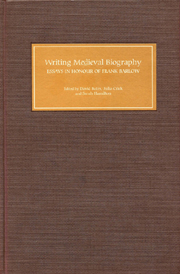Book contents
- Frontmatter
- Contents
- Preface
- List of Abbreviations
- Introduction
- 1 Did Charlemagne have a Private Life?
- 2 Bones for Historians: Putting the Body back into Biography
- 3 ‘Carriers of the Truth’: Writing the Biographies of Anglo-Saxon Female Saints
- 4 Alfred and his Biographers: Images and Imagination
- 5 Re-Reading King Æthelred the Unready
- 6 Writing the Biography of Eleventh-Century Queens
- 7 The Flemish Contribution to Biographical Writing in England in the Eleventh Century
- 8 The Conqueror's Earliest Historians and the Writing of his Biography
- 9 Secular Propaganda and Aristocratic Values: The Autobiographies of Count Fulk le Réchin of Anjou and Count William of Poitou, Duke of Aquitaine
- 10 Reading the Signs: Bernard of Clairvaux and his Miracles
- 11 Arnulf's Mentor: Geoffrey of Léves, Bishop of Chartres
- 12 The Empress Matilda as a Subject for Biography
- 13 The Gesta Stephani
- 14 Writing the Biography of Roger of Howden, King's Clerk and Chronicler
- 15 Writing a Biography in the Thirteenth Century: The Construction and Composition of the ‘History of William Marshal’
- 16 The Strange Case of the Missing Biographies: The Lives of the Plantagenet Kings of England 1154–1272
- Index
9 - Secular Propaganda and Aristocratic Values: The Autobiographies of Count Fulk le Réchin of Anjou and Count William of Poitou, Duke of Aquitaine
Published online by Cambridge University Press: 12 September 2012
- Frontmatter
- Contents
- Preface
- List of Abbreviations
- Introduction
- 1 Did Charlemagne have a Private Life?
- 2 Bones for Historians: Putting the Body back into Biography
- 3 ‘Carriers of the Truth’: Writing the Biographies of Anglo-Saxon Female Saints
- 4 Alfred and his Biographers: Images and Imagination
- 5 Re-Reading King Æthelred the Unready
- 6 Writing the Biography of Eleventh-Century Queens
- 7 The Flemish Contribution to Biographical Writing in England in the Eleventh Century
- 8 The Conqueror's Earliest Historians and the Writing of his Biography
- 9 Secular Propaganda and Aristocratic Values: The Autobiographies of Count Fulk le Réchin of Anjou and Count William of Poitou, Duke of Aquitaine
- 10 Reading the Signs: Bernard of Clairvaux and his Miracles
- 11 Arnulf's Mentor: Geoffrey of Léves, Bishop of Chartres
- 12 The Empress Matilda as a Subject for Biography
- 13 The Gesta Stephani
- 14 Writing the Biography of Roger of Howden, King's Clerk and Chronicler
- 15 Writing a Biography in the Thirteenth Century: The Construction and Composition of the ‘History of William Marshal’
- 16 The Strange Case of the Missing Biographies: The Lives of the Plantagenet Kings of England 1154–1272
- Index
Summary
Et ieu prec en Iesu del tron
Et en romans et en lati
And I pray to the lord Jesus on [his] throne/ Both in romance and in Latin
(Pos de chantar m'es pres talentz/ Since the wish to sing has taken me …) (lines 23–4)
WILLIAM, Count of Poitou and Duke of Aquitaine here sang of his grief at leaving ‘the lordship of Poitou’ (‘Lo departirs m'es aitan grieus/ Del seignoratge de Peitieus’, lines 9–10), of fear for his son who was still ‘young and feeble’ (‘iov' e mesqui’, line 20) and exposed to war and threats from enemies. His short lyric certainly does not resemble a conventional biographical text of this time, but is entirely biographical – indeed autobiographical – in character. The poet sang of war and the danger of being attacked: he also rejoiced that he had been a man of ‘prowess and joy’ (‘De proeza e de joi fui’, line 25), of ‘joy and delight’ (‘joi et deport’, line 39) and recalled the furs (‘E vair et gris e sembeli’, line 41) which symbolised the luxury of his secular existence. He now has to renounce everything that he has loved – ‘chivalry and pride’ – and prays to God to receive him among his ‘own people’:
Tot ai guerpit cant amar sueill,
Cavalaria et orgueill…
E prec li [i.e. Dieu] que.m reteng’ am si. (lines 33–4, 36)
This poet was born in the year 1071 into one of the most illustrious aristocratic families of the Capetian kingdom of France.
- Type
- Chapter
- Information
- Writing Medieval Biography, 750–1250Essays in Honour of Frank Barlow, pp. 143 - 160Publisher: Boydell & BrewerPrint publication year: 2006



